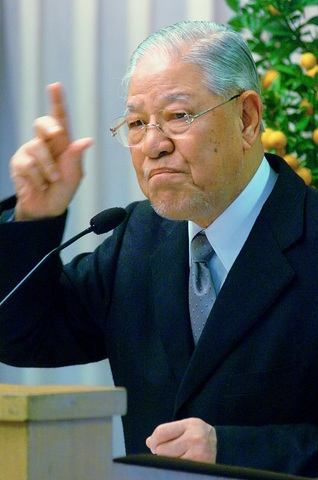Former President Lee Teng-hui (李登輝) yesterday expressed his disapproval with the 10-point consensus reached on Thursday between President Chen Shui-bian (陳水扁) and People First Party (PFP) Chairman James Soong (宋楚瑜), calling into question the joint statement's legitimacy and legality.
The joint statement signed by "the president, who is the head of state, and the chairman of a minor party, seemed like a diplomatic statement signed between two nations," Lee said.

PHOTO: SEAN CHAO, TAIPEI TIMES
"Where is its legitimacy or rationality? Simply put, it was wrong," he added.
Lee made the remarks yesterday while speaking at a forum sponsored by pro-independence groups on the issue of China's proposed "anti-secession law."
Lee's remarks would be the first time since Thursday's meeting that the former president publicly expressed his view on the consensus.
The agreement was produced following the Chen-Soong meeting, in which Chen reaffirms his "four noes plus one" pledge, including no declaration of independence, no change of the nation's official name, no referendum to change the status quo of the Taiwan Strait, no inclusion of the "state-to-state" theory on cross-strait ties in the Constitution and no disbanding of the National Unification Guidelines or the National Unification Council.
Many pan-green camp supporters were shocked by the agreement and criticized Chen for "surrendering to pro-unification forces."
Lee said that he, as well as all others, should not to have objected to whatever was discussed between Chen and Soong at the meeting, which was held for the sake of political stability.
The problem with the Chen-Soong meeting, Lee said, lied in the details of the 10-point consensus.
"Does [the consensus] represent Chen's own position, the Democratic Progressive Party's (DPP) position, the PFP's position or Chen and Soong's personal opinions?" he said.
The former president later called on the people of Taiwan to not be too nervous about the agreement.
"The democratic awareness of the Taiwanese people has improved, and we do not need to worry about rhetoric which looks down on democratic views," he said.
On the issue of Beijing's determination to enact its proposed "anti-secession law" when the rubber-stamp National Peoples' Congress meets early next month, Lee urged the public to speak out against the proposed law and not to allow China to unilaterally change the status quo. He also said the proposed law would deter Taiwan from becoming a "normal" country.
The former president also took the opportunity to express his concern about the "rapid cross-strait economic integration." Taiwan could fall into Beijing's trap, using its increasing economic clout to advance its goal of unification, Lee said.
Lee also said that the nation's economic policies should not be separated from politics, and that "the government should not exclusively consider views of businesspeople."
With the 228 Peace Memorial Day approaching, the former president said the event, although having left an unforgettable impact on society, was also a valuable history lesson for people of Taiwan, as it leads one to reconsider the idea of the "motherland" and relations between Taiwan and China.

The High Prosecutors’ Office yesterday withdrew an appeal against the acquittal of a former bank manager 22 years after his death, marking Taiwan’s first instance of prosecutors rendering posthumous justice to a wrongfully convicted defendant. Chu Ching-en (諸慶恩) — formerly a manager at the Taipei branch of BNP Paribas — was in 1999 accused by Weng Mao-chung (翁茂鍾), then-president of Chia Her Industrial Co, of forging a request for a fixed deposit of US$10 million by I-Hwa Industrial Co, a subsidiary of Chia Her, which was used as collateral. Chu was ruled not guilty in the first trial, but was found guilty

DEADLOCK: As the commission is unable to forum a quorum to review license renewal applications, the channel operators are not at fault and can air past their license date The National Communications Commission (NCC) yesterday said that the Public Television Service (PTS) and 36 other television and radio broadcasters could continue airing, despite the commission’s inability to meet a quorum to review their license renewal applications. The licenses of PTS and the other channels are set to expire between this month and June. The National Communications Commission Organization Act (國家通訊傳播委員會組織法) stipulates that the commission must meet the mandated quorum of four to hold a valid meeting. The seven-member commission currently has only three commissioners. “We have informed the channel operators of the progress we have made in reviewing their license renewal applications, and

‘DENIAL DEFENSE’: The US would increase its military presence with uncrewed ships, and submarines, while boosting defense in the Indo-Pacific, a Pete Hegseth memo said The US is reorienting its military strategy to focus primarily on deterring a potential Chinese invasion of Taiwan, a memo signed by US Secretary of Defense Pete Hegseth showed. The memo also called on Taiwan to increase its defense spending. The document, known as the “Interim National Defense Strategic Guidance,” was distributed this month and detailed the national defense plans of US President Donald Trump’s administration, an article in the Washington Post said on Saturday. It outlines how the US can prepare for a potential war with China and defend itself from threats in the “near abroad,” including Greenland and the Panama

Taiwan People’s Party (TPP) Chairman Huang Kuo-chang (黃國昌) yesterday appealed to the authorities to release former Taipei mayor Ko Wen-je (柯文哲) from pretrial detention amid conflicting reports about his health. The TPP at a news conference on Thursday said that Ko should be released to a hospital for treatment, adding that he has blood in his urine and had spells of pain and nausea followed by vomiting over the past three months. Hsieh Yen-yau (謝炎堯), a retired professor of internal medicine and Ko’s former teacher, said that Ko’s symptoms aligned with gallstones, kidney inflammation and potentially dangerous heart conditions. Ko, charged with